Remembering Gerard Van der Leun: Bon Voyage, — Mon Semblable, — Mon Frère!
+ Guest Pieces by Gerard Van der Leun: The Name in the Stone, Thom Gunn [ 1929–2004 ], and LAST POST: So Long. See You All a Little Further Down the Road
Remembering Gerard Van der Leun: Bon Voyage, — Mon Semblable, — Mon Frère!
by Margaret Anna Alice

“Sorry but I am dealing with some health issues that require I conserve my efforts. I do admire your work intensely and hope to help along to the extent of my ability
Best Christmas to you and God Bless.”
When I read those words from American Digest publisher Gerard Van der Leun on Christmas, I did not realize they would be the last ones he would write to me.
A month later, his girlfriend, a blogger known as The New Neo, wrote, “Gerard died peacefully in the small hours of the morning.”
That was on January 27, 2023—three days after she reported he’d gone into hospice care, itself less than a week after he’d been diagnosed with cancer.
And it wasn’t just any cancer. It was turbo cancer, according to Ann Barnhardt:
“Van der Leun of AmericanDigest.org – the bloggers’ blog – died yesterday from TurboCancer. He posted a month ago today, in fact through December 30th, in normality. He died yesterday of TurboCancer. He said publicly that he got the two first clot shots. I’ll leave it at that. But remember, one month ago today Gerard Van der Leun was doodling and toodling along like everything was fine, and today he is dead from cancer so aggressive that it took him from diagnosis to slab in DAYS. That’s what happens when you have no functioning immune system. For… whatever reason.”
One of my commenters alerted me to the gutting news on January 30. I sobbed as I read through the progression of posts documenting his hospitalization for COVID and back pain, his premature return home jotted down in his last post, the glimmer of hope that accompanied his transfer to rehab and negative COVID test, the rounds of testing—all concluding with the shattering diagnosis:
“This is the news no one wants to hear. It is my sad task to tell you that Gerard has cancer that has metastasized, and that treatment offers very little or nothing at this point. He has entered hospice care, his younger brother is with him, and other loved ones have gathered or are gathering to visit, as well as church members and pastor.”
I then revisited our correspondence, treasuring each poetic word—including the literal poem he wrote for me during his attempt to republish my Letter to the Menticided: A 12-Step Recovery Program (which he said reminded him of his New York Times Anonymous: The 12 Steps):
Márgarét, áre you gríeving
Over Substack code deceiving, ?
Code learning to write hells of spam, you
With seething cranium to care for, can you?
Ah! ás the brain grows older
It will shrink to insights colder
By and by, nor spare a “Why?”
While wading pools of Libdrool lies;
And yet you cringe and say “Why, why?”.
Now no matter, child, white shame:
Genetics’ spríngs sprout the same.
Nor clown had, no nor moron, expressed
What truth was heard clear, Holy Ghost guessed:
It ís the blight Libs was born for,
It is Progtards you mourn for.
In my reply to this gift, I asked:
“How did you know I was a Gerard Manley Hopkins fan? I included ‘Pied Beauty’ in my thank-you post to my readers last year.
“Are you named for him?”
He told me he was “named for my uncle who died in WWII.” I did not learn until later the layers of grief behind those words. But I will let Gerard tell that story.
His readers never saw my letter because, “Alas as I published this with the HTML something deep in the code replaced the font on my entire site”—an implosion he took in equanimous stride.
Not long after, he wrote these kind words to introduce my Corona Investigative Committee presentation notes:
“The savage and brilliant Margaret Anna Alice is asking why a lot in A Mostly Peaceful Depopulation. Here are some questions she poses concerning… TOTALITARIANISM”
When I thanked him for this surprise, he replied:
“I wish I could do more and shall. I do think you are admirable in your intensely researched essays. As well as being a formidable essayist.”
He then let me know, “I’m going to lift your entire linksoaked text on A Primer for the Propagandized,” which he soon did, describing it as “one of her shorter raids on the inarticulate.”
Gerard was one of the few publishers to pick up my third essay, Dr. Mengelfauci: Pinocchio, Puppeteer, or Both?, which followed on the heels of his publication of Letter to a Colluder, prefaced with “VERY IMPORTANT.”
When he wrote to let me know he had gifted me a complimentary subscription to his New American Digest (now defunct, sadly), he included this adapted literary reference some of you may recognize from The Waste Land—a line Eliot had leased from Baudelaire’s preface to Fleurs du Mal:
“Bon voyage mon semblable,-mon sœur.”
This spoke to our shared love of poetry. I once wrote him:
“I appreciated your Thom Gunn poem a while back as it reminded me of Oliver Sacks, one of my favorite and most-missed human beings and a dear friend of Thom’s. He discusses their friendship in his autobiography, On the Move.”
He informed me that Gunn was his teacher at Berkeley and gave me a peek at the memoir he wrote after Thom’s death, noting, “I’ve back posted it amidst the detritus of October and it should now be readable under this link.”
I replied:
“That portrait was poetry and brought tears to my eyes. It is a privilege to have met him through the words of two keen observers and fiery souls who loved him. I don’t think I knew that Oliver’s On the Move title came from a Thom Gunn poem, or if I did, I’d forgotten.… Thank you for sharing that ode to your beloved mentor.”
Since Gerard had surreptitiously published this memoir for me, it’s possible no one else has ever read it. It is my privilege to share it below sandwiched between the two pieces he asked Neo to publish upon his departure.
Originally posted on Memorial Day 2003, The Name in the Stone honors Gerard’s namesake, whose burial in the Atlantic at the age of twenty-two carved an indelible grief into his family tree.
As my husband read me this essay several days after Gerard’s death, I found myself weeping for both Gerards, for the innumerable soldiers whose lives were sacrificed in the name of ignoble lies, and for the family members whose hearts have forever been torn asunder—like Cindy Sheehan, whose son’s forty-fourth birthday would be today had Casey not been slaughtered at the age of twenty-four “in another US war for profit and global domination.”
While not a veteran, Gerard is a victim of the invisible war being waged against the public by philanthropaths, tyrants, and colluders—a war that is now known to have killed 13 million individual human beings to date.
And so, on this Memorial Day 2023, I commemorate Gerard and his fellow victims of democide as well as his uncle and every other soldier who has fallen on the battlefield throughout our blood-drenched history.
May the anguished lament of the third Gerard serve as their funeral rites.
‘No worst, there is none. Pitched past pitch of grief.’
by Gerard Manley Hopkins
No worst, there is none. Pitched past pitch of grief,
More pangs will, schooled at forepangs, wilder wring.
Comforter, where, where is your comforting?
Mary, mother of us, where is your relief?
My cries heave, herds-long; huddle in a main, a chief
Woe, wórld-sorrow; on an áge-old anvil wince and sing —
Then lull, then leave off. Fury had shrieked ‘No ling-
ering! Let me be fell: force I must be brief.’”
O the mind, mind has mountains; cliffs of fall
Frightful, sheer, no-man-fathomed. Hold them cheap
May who ne’er hung there. Nor does long our small
Durance deal with that steep or deep. Here! creep,
Wretch, under a comfort serves in a whirlwind: all
Life death does end and each day dies with sleep.
The Name in the Stone
“Gerard Van der Leun” was, of course, not me. He was someone else entirely. Someone who had been born, lived, and died before I was even conceived.
by Gerard Van der Leun
Written and first published at American Digest on Memorial Day, 2003
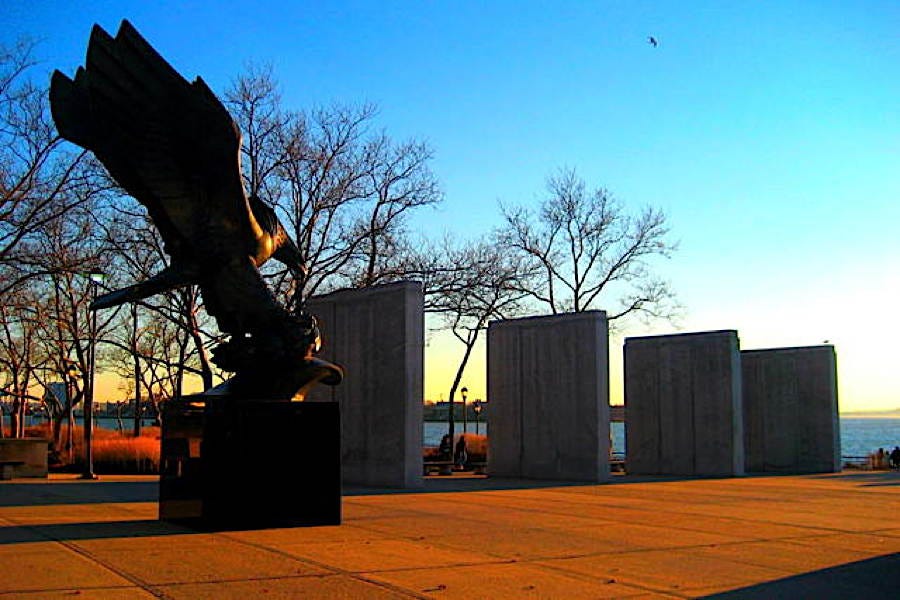
On Living with the Loss of a Son in Wartime.
My name, “Gerard Van der Leun,” is an unusual one. So unusual, I’ve never met anyone else with the same name. I know about one other man with my name, but we’ve never met. I’ve seen his name in an unusual place. This is the story of how that happened.
It was an August Sunday in New York City in 1975. I’d decided to bicycle from my apartment on East 86th and York to Battery Park at the southern tip of the island. I had nothing else to do and, since I hadn’t been to the park since moving to the city in 1974, it seemed like a destination that would be interesting. Just how interesting, I had no way of knowing when I left.
August Sundays in New York can be the best times for the city. The psychotherapists are all on vacation—as are their clients and most of the other professional classes. The city seems almost deserted, the traffic light and, as you move down into Wall Street and the surrounding areas, it becomes virtually non-existent. On a bicycle, you own the streets that form the bottom of the narrow canyons of buildings where, even at mid-day, it is still cool with shade. Then you emerge from the streets into the bright open space at Battery Park.
Tourists are lining up for Ellis Island and the Statue of Liberty. A few people are coming and going from the Staten Island Ferry terminal. There are some scattered clots of people on the lawns of Battery Park. Everything is lazy and unhurried.
I’d coasted most of the way down to the Battery that day since, even though it appears to be flat, there is a very slight north-to-south slope in Manhattan. I arrived only a bit hungry and thirsty and got one of the dubious Sabaretts hot dogs and a chilled coke from the only vendor working the park.
We were in the midst of what now can be seen as “The Long Peace.”
The twin towers loomed over everything, thought of, if they were thought of at all, as an irritation in that they blocked off so much of the sky. It was 1975 and, Vietnam notwithstanding, America was just about at the midway point between two world wars. Of course, we didn’t know that at the time. The only war we knew of was the Second World War and the background hum of the Cold War. It was a summer Sunday and we were in the midst of what now can be seen as “The Long Peace.”
In front of the lawns at Battery Park was a monument that caught my attention. It was formed of an immense stone eagle and two parallel rows of granite monoliths about 20 feet wide, 20 feet tall, and 3 feet thick. From a distance, you could see that they had words carved into them from top to bottom. There was a lot of shade between them so I took my hot dog and my coke and wheeled my bike over, sitting down at random among the monoliths.
I remember that the stone was cool against my back as I sat there looking at the stone across from me on that warm afternoon. As I looked up it dawned on me that the words cut into the stones were all names. Just names. The names of soldiers, sailors, and airmen who had met their death in the North Atlantic in WWII. I was to learn later that there were 4,601 names. All lost in the frigid waters, all without any marker for their graves—except those in the hearts of those they left behind, and their names carved into these stones that rose up around me.
I read across several rows, moving right to left, then down a row, and then right to left. I got to the end of the sixth row and went back to the beginning of the seventh row.
At the beginning of the seventh row, I read the name: “Gerard Van der Leun.” My name. Cut into the stone amongst a tally of the dead.
If you have an unusual name, there’s nothing that prepares you for seeing it in a list of the dead on a summer Sunday afternoon in Battery Park in 1975. I don’t really remember the feeling except to know that, for many long moments, I became chilled.
When that passed, I knew why my name was in the stone. I’d always known why, but I’d never known about the stone or the names cut into it.
“Gerard Van der Leun” was, of course, not me. He was someone else entirely. Someone who had been born, lived, and died before I was even conceived.
Gerard Van der Leun was my father’s middle brother. He was what my family had given to stop Fascism, Totalitarianism, and Genocide in the Second World War. He was one of their three sons. He was dead before he was 22 years old. His body never was never recovered, and the exact time and place of his death over the Atlantic, unknown.
I was always called “Jerry.” “Jerry” is not a diminutive of “Gerard.”
As the first child born after his death, I was given his name, Gerard. But as a child, I was never called by that name. I was always called “Jerry.” “Jerry” is not a diminutive of “Gerard.” There are none for that name. But “Jerry” I would be because the mere mention of the name “Gerard” was enough to send my grandmother into a dark state of mind that would last for weeks. This was true, as far as I know, for all the days of her life and she lived well into her 80s.
My grandfather could barely speak of Gerard and, being Dutch, his sullen reticence let all of us know very early that it was wrong to ask.
My father, who was refused service in the Second World War due to a bout of rheumatic fever as a child that left him with a heart murmur that would kill him shortly after turning 50, was ashamed he didn’t fight and wouldn’t speak of his brother, Gerard, except to say, “He was a great kid, a brave kid.”
My uncle, the baby of the family, spent a cold couple of months of his youth freezing on the Inchon peninsula in Korea and seeing the worst of that war firsthand. He was my only living relative who’d been in a war. He would never speak of his war at all, but it must have been very bad indeed.
... a helmet shot full of holes; a boot with most of a leg still in it ...
I know this because, when I was a teenager, I was out in his garage one day and, opening a drawer of his workbench, I found an old packet of photographs, grimy with dust at the back under a bunch of rusted tools. The black and white photos with rough perforated edges showed some very disturbing things: a helmet shot full of holes; a boot with most of a leg still in it, some crumpled heaps of clothing on patches of dirty snow that proved to be, on closer inspection, dead Korean soldiers; a pile of bodies on a white snowbank with black patches of blood seeping into it. The full horror show.
My uncle had taken them and couldn’t part with them. At the same time, he couldn’t look at them. So he shoved them into a drawer with other unused junk from his past and left it at that. He never spoke of Korea except to say it was “rough,” and, now that he has quit speaking of anything, he never will. His only comment to me about his brother Gerard echoed that of my father, “He was a great kid. You can be proud to have his name. Just don’t use it around Grandma.”
And I didn’t. No one in my family ever did. All through the years that I was growing up at home, I was “Jerry.”
In time, I left home for the University and, in the manner of young men in the 1960s and since, I came upon a lot of new and, to my young mind, excellent ideas. A minor one of these was that it was time to stop being a ‘Jerry’—a name I associated for some reason with young men with red hair, freckles, and a gawky resemblance to Howdy Doody. I decided that I would reject my family’s preferences and call myself by my given name, ‘Gerard.’ In fact, in the callous manner of heedless boys on the verge of adulthood, I would insist upon it. I duly informed my parents and would correct them when they lapsed back to ‘Jerry.’
This attitude served me well enough and soon it seemed I had trained my brothers and my parents in my new name. Of course, I’d taken this name not because of who my uncle had been or because of the cause for which he gave his life, but for the selfish reason that it simply sounded more “dignified” to my ears.
I was a student at the University of California at Berkeley. It was 1965 and we had no truck with the US military that was “brutally repressing” the people of Vietnam. We were stupid and young and nothing that has happened at Berkeley since then has changed the youth and stupidity of its students. If anything, my era at the University just made it somehow possible for Berkeley students to think that their attitudes were as noble and as pure in their minds as they were stupid and selfish in reality. I was no longer a “Jerry” but a “Gerard” and I was going to make the world safe from America.
“Would you like some more creamed onions, Jerry?”
My name change plan went well as long as I confined it to my immediate family and my friends at the University. It went so well that it made me even stupid enough to try to extend it to my grandparents during a Thanksgiving at their home.
At some point during the meal, my grandmother said something like, “Would you like some more creamed onions, Jerry?”
And because I was a very selfish and stupid young man, I looked at her and said, “Grandma, everyone here knows that I’m not Jerry any longer. I’m Gerard and you’ve just got to get used to calling me that.”
A silence bloomed in the room. It rose out of the center of the table and expanded until it reached the walls and then just dropped down over all the family like a large, dark shroud.
Nobody moved. Very slowly every set of eyes of my family came around and looked at me. Not angry, but just looking. At me. The silence went on. Then my grandmother, whose eyes were wet, rose from the table and said, “No. I can’t call you that. I just can’t.” She left the table and walked down the hallway to her bedroom and closed the door behind her.
The silence compounded itself until my grandfather rose from his chair and walked to the middle of the hallway. He took a framed photograph off the wall which was hung next to a framed gold star. It had been in that place so long that I’d stopped seeing it.
My grandfather walked back to the table and very gently handed me the photograph. It showed a smooth-faced handsome young flyer with an open smile. He was dressed in a fleece-lined leather flying jacket and leaning casually against the fuselage of a bomber. You could see the clear plastic in the nose of the plane just above his head to his right. On the picture, was the inscription: “Folks Here’s my new office! Love, Gerard.”
My grandfather stood behind me as I looked at the picture. “You are not Gerard. You just have his name, but you are not him. That is my son. He is Gerard. If you don’t mind, we will continue to call you Jerry in this house. If you do mind, you do not have to come here anymore.”
Then he took the picture away and put it back in its place on the wall. He knocked on the bedroom door, went in, and in a few minutes he and my grandmother came back to the table. Nobody else had said a word. We’d just sat there. I was wishing to be just about anyplace else in the world other than where I was.
They sat down and my grandmother said, “So, Jerry, would you like some more creamed onions?”
I nodded, they were passed and the meal went on. My parents never said a word. Not then and not after. And, to their credit, they continued to call me Gerard. But never at my grandparents’ house.
A decade passed.
In 1975, I leaned against a monument in Battery Park in New York and read a name cut into stone among a list of the dead. That long-ago Thanksgiving scene came back to me in all its dreadful detail. I tried to understand what that name in the stone had meant to my family when it became the only thing that remained of their middle son; a man who’d been swallowed up in the Atlantic during a war that finished before I drew breath.
I tried to understand what such a sacrifice meant to my grandparents and parents, but I could not. I was a child of the long peace who had avoided his war and gone on to make a life that, in many ways, was spent taking down the things that my namesake had given his life to preserve. I was thirty then and not yet a parent. That would come a few years later and, with the birth of my daughter, I would at last begin, but only begin, to understand.
Today it makes me feel cheap and contemptible to think of the things I did in my youth to point out all the ways in which this country fails to achieve some fantasied perfection. I was a small part of promulgating a great wrong and a large lie for a long time, and I’m sure there’s no making up for that. My chance to be worthy of the man in the photograph, the name in the stone, has long since passed and all I can do is to try, in some way, to make what small amends I can.
Remembering these long-ago moments now as we linger on the cusp of the Long Decline, I still cannot claim to understand the deep sense of duty and the strong feeling of honor that drove men like the uncle I’ve never known to sacrifice themselves. Lately though, as we move deeper into the Fourth World War, I think that, at last, I can somehow dimly see the outlines of what it was that moved them to give “the last full measure of devotion.” And that, for now, will have to do.
Since finding his name on the stone in 1975, I’ve been back to that place a number of times. I once took my daughter there, but in the way of heedless youth that I knew too well, she was just bored.
After September 11th, I made a point of going to the monument as soon as the way was cleared, sometime in 2002. It was for the last time.
If you go to the monument today, you can still see the name in the stone. It’s not my name, but the name of a man much better than most of us. It’s on the far left column on the third stone in on the right side of the monument looking towards the sea. The name is usually in shadow and almost impossible to photograph.
Like most of the other names carved into the stone, it’s up there very high. You can see it, but you can’t touch it. I don’t care who you are, you’re not that tall.
Thom Gunn [ 1929–2004 ]
by Gerard Van der Leun
Published at American Digest on October 1, 2022
Poet. Teacher. Mentor.
My Sad Captains
by Thom GunnOne by one they appear in
the darkness: a few friends, and
a few with historical
names. How late they start to shine!
but before they fade they stand
perfectly embodied, allthe past lapping them like a
cloak of chaos. They were men
who, I thought, lived only to
renew the wasteful force they
spent with each hot convulsion.
They remind me, distant now.True, they are not at rest yet,
but now they are indeed
apart, winnowed from failures,
they withdraw to an orbit
and turn with disinterested
hard energy, like the stars.
Thom (Thomson) William Gunn, poet, born August 29 1929; died April 25 2004….
No. Wait. Do not go.
[ 1929–2004 ] A bracket of dates and life moves forward. If we were like the beasts that we keep that would be the whole of it. But we move forward carrying the past with us. It is true that age and the ever-spiraling cascade of experience force us to discard large files of memory along the way, but if we are wise we keep those memories that sustain us and let the rest pass.
It is 1967 and I’m living with six other crazed young artists and hipsters in The Green House off Telegraph south of UC Berkeley.
The Green House was not a special place for the time. It was, in that time and in that place, ordinary. The most ordinary place in the world. If the Green House was neither real nor natural, it was fraught with a strange excitement, fecund with endless possibility. It was built of a metaphysic so loose that the most absurd accident could happen and it would only be a part of the Grand Design. It was a place where revelation and prophecy were daily events, the Second Coming scheduled for tomorrow after lunch, magic considered merely another, older branch of science, poetry an acceptable mode of speech, and caricature a widely appreciated attitude. As far as we know Rasputin, William Blake, St. Teresa, and Walt Whitman had never lived in The Green House, but they would have been welcome if they had wandered in.
1967: Because there’s a war on, I’m trying to stay in school. But because there’s a war on I’m trying to leave school. I’m also trying to become a poet for reasons that are now obscure other than it seemed like ‘a good idea at the time.’ Off the kitchen in The Green House is a small mud room with a screened window. Nasturtium and morning glories have twined across the screen and late into the night I sit scribbling and typing one attempt at poetry after another only to abandon most of them at first light. Dawn always reveals a small pool of crumpled sheets filled with errors, false starts, bad endings, failed metaphors, forced similies — all the detritus of …
Trying to use words, and every attempt
Is a wholly new start, and a different kind of failure
Because one has only learnt to get the better of words
For the thing one no longer has to say, or the way in which
One is no longer disposed to say it… —Eliot
It had not been my habit to throw anything away the previous year. Everything I wrote seemed to my young mind to be touched with light. Now I knew it had been garbage and had destroyed most of it. How did I know that? Because I had been fortunate enough to find myself in a poetry composition class taught by Thom Gunn.
1967: How many teachers do we have during our formal schooling? Two or three dozen? Fifty at most. How many do we remember? I remember three. A science teacher and a drama teacher in high school, and Gunn. I don’t remember Gunn because of how or what he taught, although that was part of it, I remember him because of who he was.
I remember the craggy, pitted face easily moved to laughter and a sensibility moved to kind despair when he was forced to experience a particularly bad line from one of his students. I remember that the class was formed of about 12 students and that on any given day at least ten were baked to a crisp. But that didn’t mean Gunn didn’t get our attention. How could he not? He was not only an elegant poet, an inheritor of the Tennysonian tradition in English poetry, but he was an elegant man.
I remember the craggy, pitted face easily moved to laughter and a sensibility moved to kind despair when he was forced to experience a particularly bad line from one of his students.
Gunn commuted in from his other life in San Francisco on a powerful motorcycle in leather and Levis. Then, before taking up his duties as a teacher, he’d change into what had to be bespoke English Suits and cowboy boots. It was a look that the students in his class—mired as we were in the hippy-regalia of the time—could not hope to emulate. But it was a look that spoke of refinement and manliness at the same time. It was not too much to say that we worshipped the man.
Unlike other ‘established poets’ I’ve run into here or there over the years, the hours spent in Gunn’s class were never about himself or his work. We were always asking him to read to us from his work, but he never did. What we were there to discuss, he always reminded us, was our work and the work it obviously needed.
And work we did. I’ve never pushed so hard on the craft as I did during that semester. Because that was what Gunn was about, the craft. Not The craft was not about nor was the craft interested in your feelings or your petty psychosis, not the confessional spew so popular at the time. Gunn had little patience for that even though he was invariably kind about pointing it out. What Gunn was interested in teaching was the one thing he knew he could teach: the craft, the rhetorical shape, and the internal beat, the way in which you could put words together to get a specific emotion back from the reader; the painting techniques of poetry; how to draw from life with words.
Most of the time, you failed at the craft since you’d been taught that craft was a foolish tool and that emotions were all that mattered. But slowly, with his remarks in class and his reactions to the work you submitted, you came to understand that you were actually improving. In hopes of improving more, you bought his books and internalized his poems. I have all his books now, the oldest of which I bought in 1967. I’ve read through and around them many times and they never fail to enhance and expand my life.
Gunn was kind and unsparing with his criticism, but he held back his praise. Somewhere I still have a sheet of paper with his polished handwriting telling me how vivid and effective he thought it was. I kept it pinned in front of wherever I was writing for years. It strikes me now that I’d really like to find it.
In time the class ended, summer came on, and I left the University and fled to Europe. Several years passed and I was working in an office south of Market Street in San Francisco. I was walking back to the job while waiting for a light, a motorcycle pulled up next to me at the curb. Black motorcycle. Helmeted rider. Bespoke English three-piece suit. Cowboy boots.
Recognizing me he lifted his visor and smiled that smile that made the day brighter. Held out his hand and we shook. The light changed and I said, just to be clever in the way that young men are, ‘Man, you gotta go,’ a phrase that opens one of his motorcyclist poems, “On the Move.” He laughed, nodded, hit the throttle, and faded away down the long boulevard.
Recognizing me he lifted his visor and smiled that smile that made the day brighter. Held out his hand and we shook. The light changed and I said, just to be clever in the way that young men are, ‘Man, you gotta go,’ a phrase that opens one of his motorcyclist poems, “On the Move.” He laughed, nodded, hit the throttle, and faded away down the long boulevard.
I never saw him again, but like all teachers and mentors that have touched our lives, he’s never really been absent. More than once over the years, I wanted to seek him out if only to thank him for what he’d added to my life. That always seemed beside the point. Now, to my regret, it is too late. Still, when I think of him or read his work as I will until my time arrives, I’ll always carry the memory of those classes and the long nights working amid the growing pile of crumpled paper on the floor in The Green House. In the end, that’s what the great teachers and poets leave us, the memories that live, the memories we choose to carry all our lives.
LAST POST: So Long. See You All a Little Further Down the Road
by Gerard Van der Leun (Gerard requested that this song serve as his last post, with his postscript at the end)
Published at American Digest on February 4, 2023
(Lyrics for No Hard Feelings by the Avett Brothers below)
When my body won’t hold me anymore
And it finally lets me free
Will I be ready?
When my feet won’t walk another mile
And my lips give their last kiss goodbye
Will my hands be steady when I lay down my fears, my hopes, and my doubts?
The rings on my fingers, and the keys to my house
With no hard feelings
When the sun hangs low in the west
And the light in my chest won’t be kept held at bay any longer
When the jealousy fades away
And it’s ash and dust for cash and lust
And it’s just hallelujah
And love in thought, love in the words
Love in the songs they sing in the church
And no hard feelings
Lord knows, they haven’t done much good for anyone
Kept me afraid and cold
With so much to have and hold
When my body won’t hold me anymore
And it finally lets me free
Where will I go?
Will the trade winds take me south through Georgia grain?
Or tropical rain?
Or snow from the heavens?
Will I join with the ocean blue?
Or run into a savior true?
And shake hands laughing
And walk through the night, straight to the light
Holding the love I’ve known in my life
And no hard feelings
Lord knows they haven’t done much good for anyone
Kept me afraid and cold
With so much to have and hold
Under the curving sky
I’m finally learning why
It matters for me and you
To say it and mean it too
For life and its loveliness
And all of its ugliness
Good as it’s been to me
I have no enemies
I have no enemies
I have no enemies
I have no enemies
[THIS SITE — AND ITS ARCHIVES — WILL BE MAINTAINED FOR TWO YEARS FROM THIS DATE. AFTER THAT “DIGITAL DUST TO DIGITAL DUST.”
BTW: I’VE NEVER STOPPED LOVING YOU, JUSTINE, MY DAUGHTER. No hard feelings. Remember me, from time to time, to my granddaughters.]
Addendum by MAA:
This comment by Jason Powers was so profound, I felt it earned its place as the closing words:
“Gerard, um, Jerry was a great writer. I read that short piece, and felt like a journey through time unfolded, and that is worth a lot in this time.
“My prayers, Jerry.
“You did earn the right to be called Gerard after all.
“Gerard will meet you soon.”
© Margaret Anna Alice, LLC
🙏 You Make This Work Possible
For 16.4 cents/day (annual) or 19.7 cents/day (monthly), you can help me fight tyranny and stop democide while enjoying access to premium content like “rolling” interviews, podcasts, Memes by Themes, Behind the Scenes, and bonus articles:
🤲 One-Time Support
After PayPal canceled me last year, my donations plummeted and I lost nearly all of my recurring donations. This is just one of the many ways the silencers try to hurt dissidents. Thank you for whatever you can give to help me fight back.
In Memory of Another Fallen Veteran
Below is a guest piece I published last Veterans Day by a recently departed veteran.
🛒 Spread the Words
If you would like to help propagate the message that Mistakes Were NOT Made, you will find a wide selection of products in my Mistakes Were NOT Made collection, including:
🗒 Join me on Substack Notes!
You can find my Notes here.
🐇 Follow Me on Social Media
I always alert my social media followers to new posts, so if your Substack notifications become disabled without your notice (as a number of my readers have reported), following me on other outlets will ensure you don’t miss anything.
📼 Subscribe to My Channels
Follow my channels if you’d like to be notified when I upload new videos.
Visit BioLink to find all of my social media accounts:
🌟 WARM GRATITUDE FOR THE RECS!
The single-most important driver for new readers joining my mailing list is Substack recommendations. I want to thank every one of you who feels enthusiastic enough about my Substack to recommend it, and I especially appreciate those of you who go the extra mile to write a blurb!
📚 Order Signed Copies
I offer bulk discounts on signed copies of my fairy tale The Vapor, the Hot Hat, & the Witches’ Potion. Reply to any of my newsletters (or the Welcome email if you’re new) to place your order via email. You can also buy directly from Amazon if you prefer.
Download the E-Book
Paid subscribers can download the beautifully typeset and illustrated e-book of my fairy tale, The Vapor, the Hot Hat, & the Witches’ Potion. It is equivalent to the paperback version (retails $12.99) and much prettier than the Kindle version (retails $5.99). Click here to access the downloadable PDF (the post will be unlocked once you subscribe).
⏰ Wake-up Toolkit
If you’re new to my Substack, my Wake-up Toolkit is a great way to get acquainted with my content. I’ve organized my articles by topic for easy reference and use in your red-pilling efforts as needed. I will update this to reflect new content as it is published.
🎓 IPAK-EDU
Click here to see upcoming IPAK-EDU courses, and please use my affiliate code (MAA1IPAK) to register for any you decide to take.
If you feel the work I am doing is worthwhile and want to make it possible for me to spend more time writing and researching in my aim to unmask totalitarianism and awaken the sleeping before tyranny triumphs, please consider supporting me, whether it be by subscribing; buying me a Ko-fi or coffee; or sharing my posts. I thank you for reading, thinking, sharing, and supporting my work in whichever ways you choose.
Prefer to donate crypto? You can send Bitcoin using the following code:
bc1ql706rr7vj7c7nzxnqfp9rldw8ddfc20f492jk0
Since crypto transfers are anonymized, I won’t know about your donation. Please drop me an email by responding to any of my newsletters if you’d like to alert me to your generous gift.
Remember, a subscription to Margaret Anna Alice Through the Looking Glass makes for an intellectually adventurous gift down the rabbit-hole!
Note: Purchasing any items using Amazon affiliate links included in my content will further support my efforts to unmask tyranny.

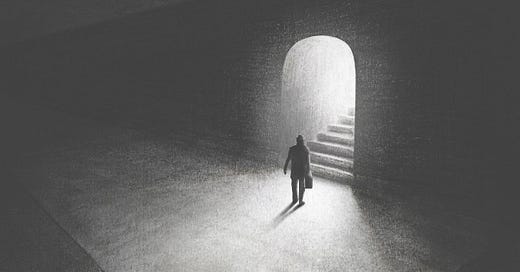




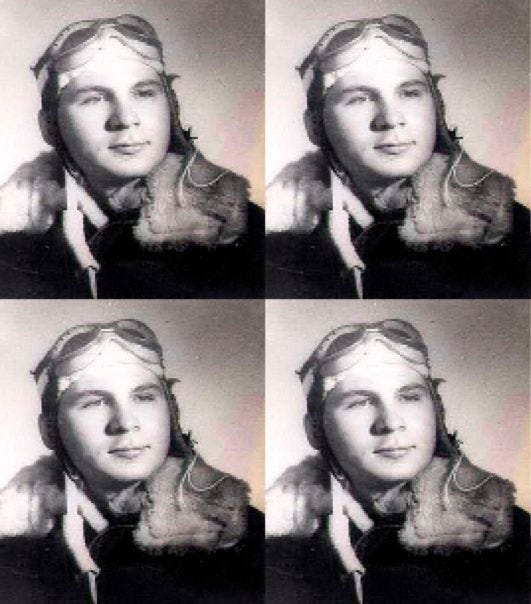
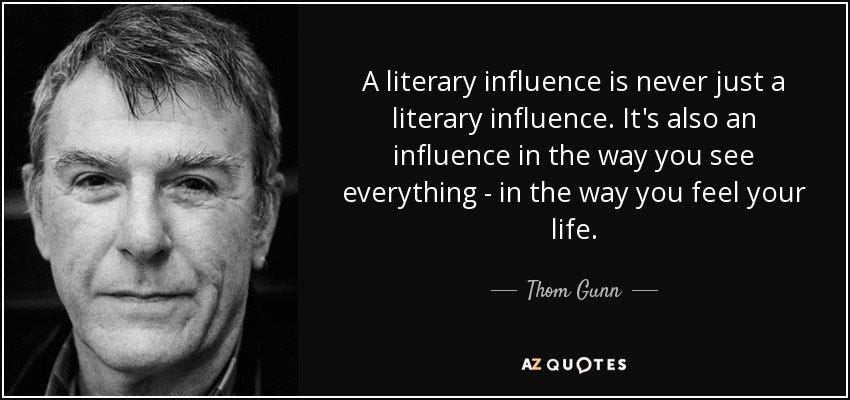



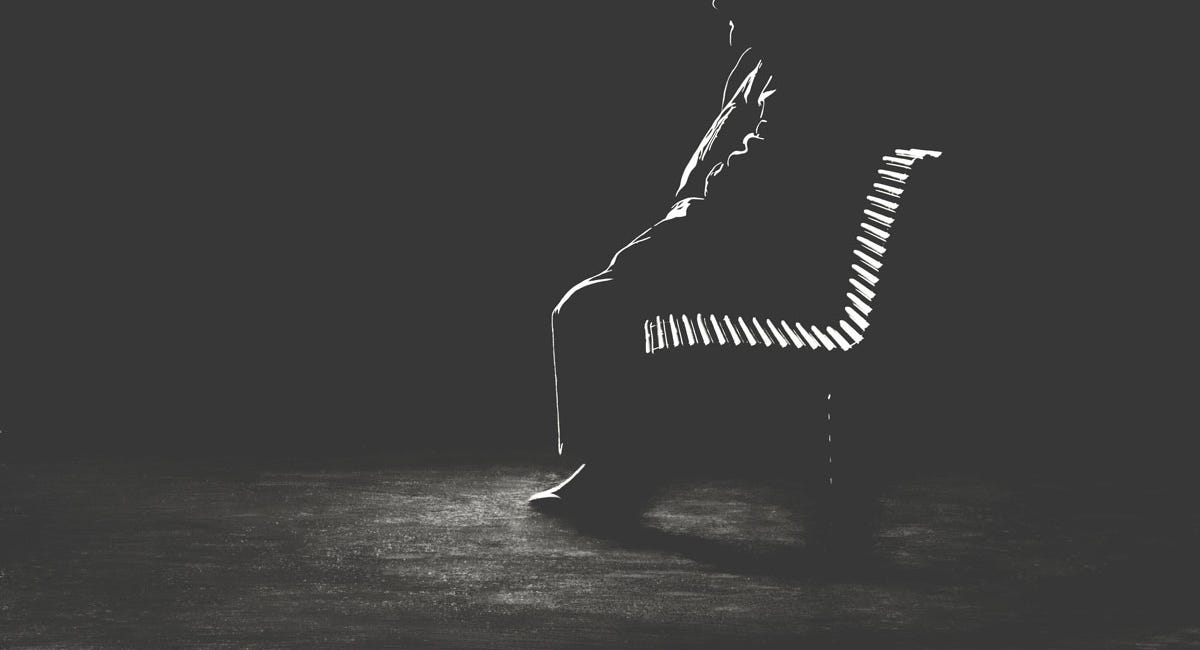






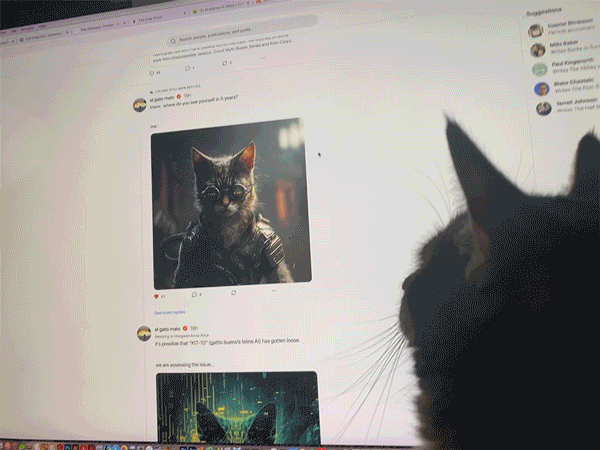

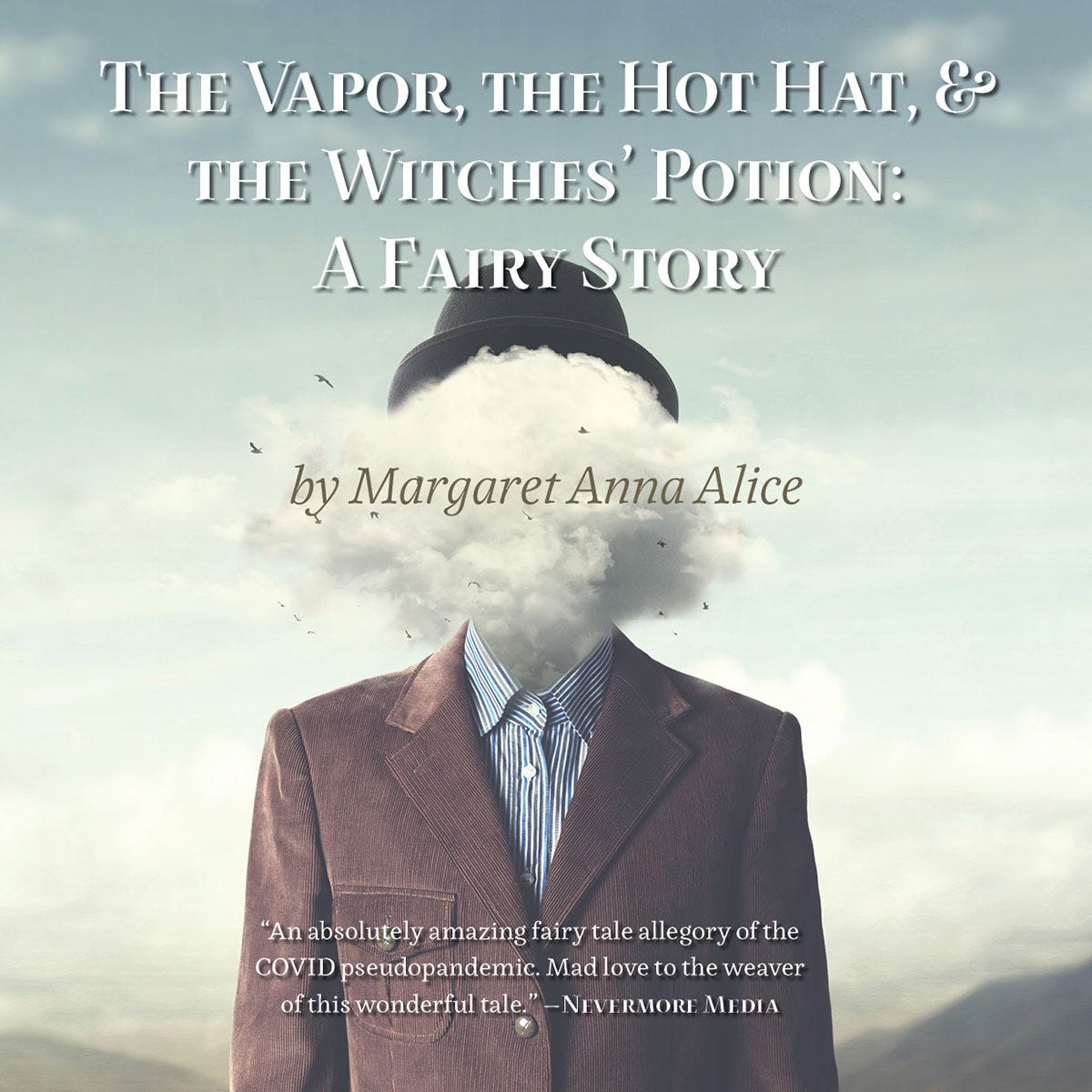

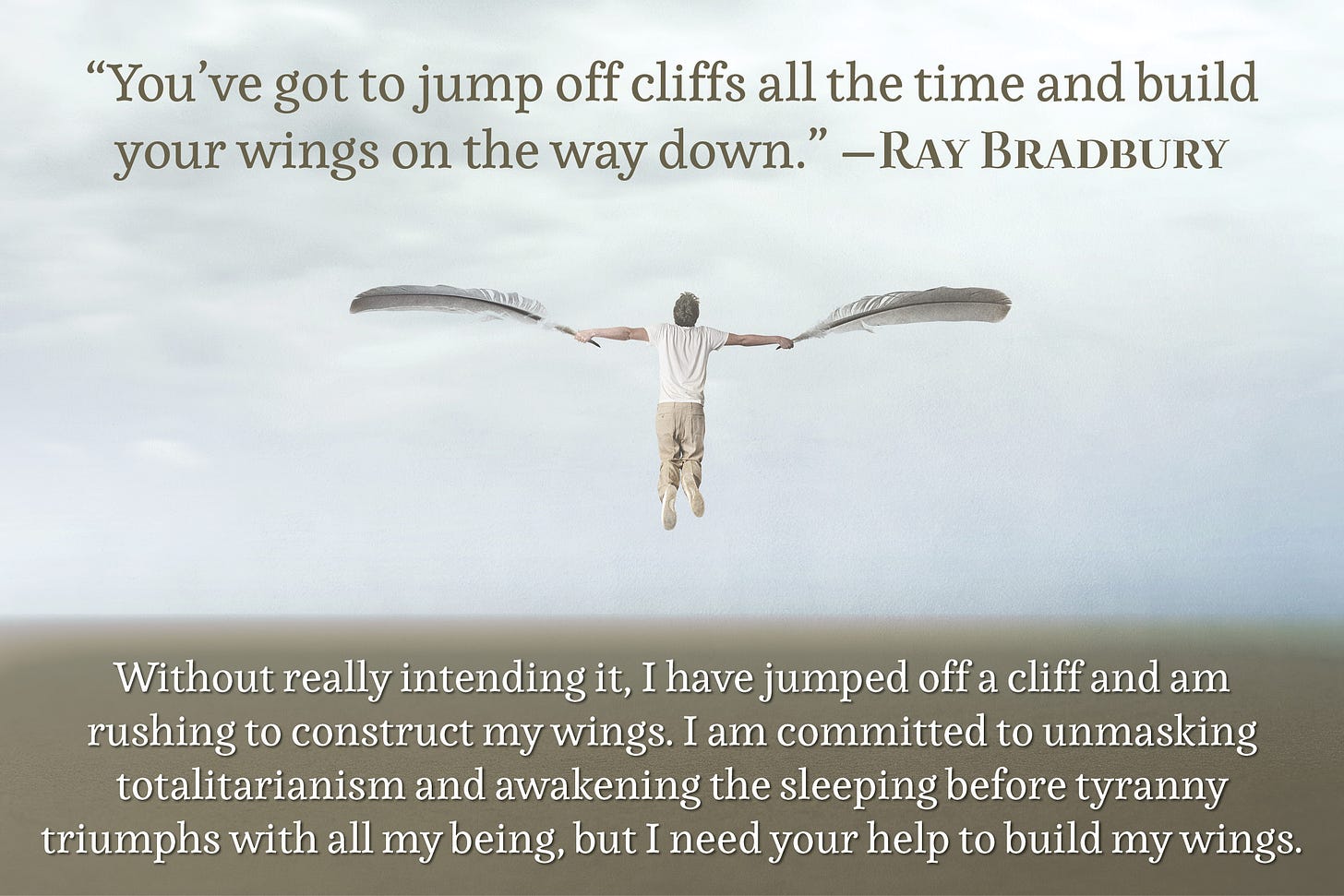



As Always, well written MAA.
I Appreciate the acknowledgement of those lost in war and the silent war a lot of us have come to understand more recently. May your pen burn Bright MAA. ❤
"While not a veteran, Gerard is a victim of the invisible war being waged against the public by philanthropaths, tyrants, and colluders—a war that is now known to have killed 13 million individual human beings to date.
And so, on this Memorial Day 2023, I commemorate Gerard and his fellow victims of democide as well as his uncle and every other soldier who has fallen on the battlefield throughout our blood-drenched history."
WE ARE IN A BLOOD DRENCHED WAR RIGHT NOW. GENOCIDE GOING ON ON THE BATTLEFIELD OF HUMANITY RIGHT NOW. JAB, JAB, JAB ...